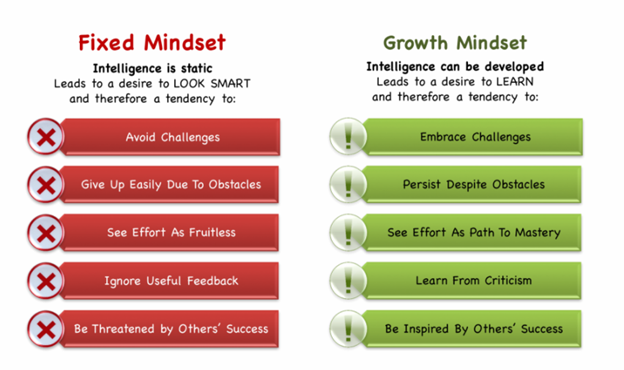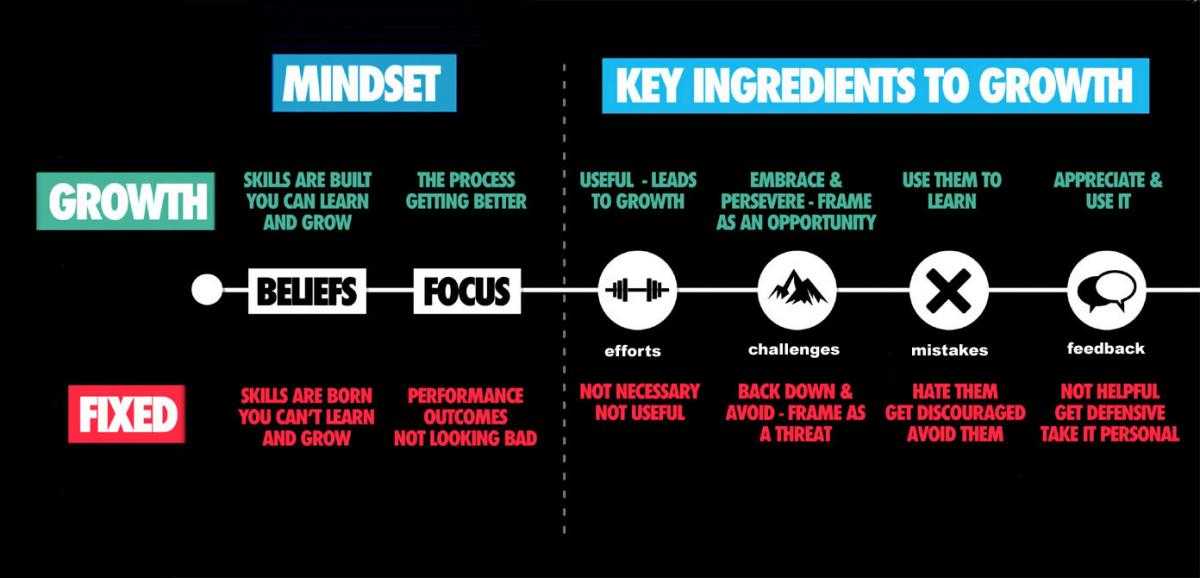Summary - Growth vs Fixed Mindset
The book Mindset: The New Psychology of Success was written by Carol Dweck
If you possess the fixed mindset, you are most concerned with how you’ll be judged; the growth mindset makes your primary concern how you can improve yourself. With the fixed mindset, you see the traits as fixed, and consequently success is about proving you’re smart or talented. The fixed mindset is all about validation.
On the other hand, the growth mindset is more about stretching yourself to learn something new. With the growth mindset, your goal is to develop yourself and become the best version of yourself.
People in a growth mindset always seek a challenge and, even more importantly, they thrive on it.
Fixed
In the fixed mindset, everything is about the outcome. If you fail or if you aren’t the best, everything was wasted.
People with the fixed mindset believe that an ability shows up on its own, before any learning and persisting through failure. You either have it or you don’t. It’s either in your genes or it isn’t.
Many people who suffer from the fixed mindset believe that the world needs to change and not them.
Growth
The growth mindset emphasizes the fact that we can all change, grow and progress through efforts, application and experience.
That kind of an underlying belief creates a passion for learning. In the growth mindset, it’s inconceivable to have a goal with a sense that you can actually achieve it, and then do nothing about it.
Having the growth mindset doesn’t protect you from the pain of failure. But failure doesn’t define you. A failure is only a temporary problem to be faced, dealt with, and learned from.
The hallmark of the growth mindset is a passion for stretching and pushing yourself and sticking to your goals, especially when things are not going well and you have to persist through very challenging times.
Relationships
The mindset also stretches to how you see your partner and the relationship itself. You can see your partner as a person with fixed traits or a person with the potential to grow.
In the same way, you can also see a relationship in a fixed state or as something that can grow with time. As you can assume, the fixed perspective on your partner and relationship itself carries some big challenges and problems.
You don’t only possess one mindset and that’s it. Most people have elements of both. In one area of life you have a fixed approach to life, and in the other the growth one.
Here are two examples of praising ability or effort:
- Fixed mindset praise: Good job! You must be really good at this.
- Growth mindset praise: Good job! You must have worked really hard.
The core values and main elements of such growth‑mindset environments are:
- Promoting a clear message that every skill is learnable
- Valuing effort, learning and perseverance, not just ready-made genius or talent
- Giving feedback and praise that promotes additional learning
- Seeing authority as a guide and resource for learning, not as a judge
The book suggests the following on how to learn the new growth mindset:
- When things get hard and you want to quit or you get bored, tired, dizzy or hungry, don’t fool yourself. Put yourself in the growth mindset by picturing new brain connections forming as you meet the challenge and learn. Learn to work harder and to not let go of things when they get hard.
- Don’t surround yourself with people who are in a worse position than you are just to feel better about yourself. Instead seek people who can give you constructive criticism. If you’re the smartest (or richest, or the most skillful etc.) person in the room, you’re in the wrong room.
- Analyze your heroes and people who outdid you in the past – do they poses extraordinary abilities or did they just use better strategies, practiced harder, and worked their way through obstacles? You will realize that many people who outperform you just invested more effort.
- Define your success with learning and improving, not merely winning. Admit and correct your deficiencies and enjoy the process. You can only thrive if you do self-correction. A growth‑minded person is not a judge, they’re a guide – to themselves, others or the company that they work for.
- True self-confidence is about possessing the courage to be open, to welcome ideas and change regardless of their source. Real self-confidence is not reflected in a title, a fancy car, an expensive suit or a series of business acquisitions. Real self-confidence is reflected in your mindset, in your readiness to grow.
In summary – Did I win or did I lose? Those are the wrong questions. The correct question is: did I put in my best effort?


